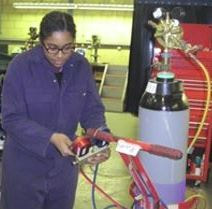21 February 2019
|
|
The Institute of Refrigeration is hosting a London TechTalk on sustainable refrigeration road transport and reducing the environmental impact of the cold chain on 7 March.
Dr Christina Francis from London South Bank University won the IOR’s Ted Perry award last year for her research into carbon emissions from Direct-Drive Last mile Refrigerated Vehicles and will talk about the research project and its impact for the future of the refrigerated road transport system in London. |
The talk, organised by the IOR in conjunction with Food Storage and Distribution Federation (FSDF), is aimed at anyone interested in finding out how analysing refrigerant leakage can be used to identify opportunities to improve environmental performance of refrigerating systems. It will also provide insights for those working to reduce carbon emissions in the cold chain or refrigerated transport sector.
Dr Francis’ work explores how through the analysis of maintenance and leakage records she was able to develop identify the likely root causes and possible solutions. Using these results and through the the real-time performance of urban direct-drive refrigerated vehicles she was able to develop best practice guidelines for the design and sustainability refrigerated road transport systems.
The EU F-Gas Regulations require both manufacturers and fleet owners of refrigerated vehicles above 3.5 tonnes to record refrigerant leakage as well as ensure leak tight and efficient refrigeration systems. In addition they have to balance the competing interests of maintaining temperature control while reducing the energy consumption of vehicles. Thus, reducing the overall environmental impact (i.e. contribution towards global warming and climate change) of refrigerated road transport systems and developing sustainable designs are imperative for the cold chain industry.
The event at London South Bank University is free to attend, register here.
To join the IOR webinar or be sent a webinar recording, please register here.
Dr Francis’ work explores how through the analysis of maintenance and leakage records she was able to develop identify the likely root causes and possible solutions. Using these results and through the the real-time performance of urban direct-drive refrigerated vehicles she was able to develop best practice guidelines for the design and sustainability refrigerated road transport systems.
The EU F-Gas Regulations require both manufacturers and fleet owners of refrigerated vehicles above 3.5 tonnes to record refrigerant leakage as well as ensure leak tight and efficient refrigeration systems. In addition they have to balance the competing interests of maintaining temperature control while reducing the energy consumption of vehicles. Thus, reducing the overall environmental impact (i.e. contribution towards global warming and climate change) of refrigerated road transport systems and developing sustainable designs are imperative for the cold chain industry.
The event at London South Bank University is free to attend, register here.
To join the IOR webinar or be sent a webinar recording, please register here.
Content continues after advertisements








